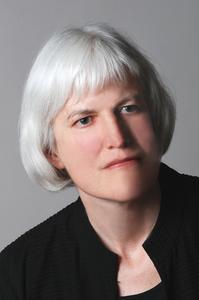“I find that Berkeley students are very serious about learning,” Kleege said recently. “Coming to Berkeley made me a better teacher.”
And quite the teacher she has become -- Kleege was recently announced as one of five winners of the 2016 Distinguished Teaching Award, UC Berkeley’s most prestigious honor for teaching. Kleege is a Lecturer in the campus Department of English, and is particularly interested in creative nonfiction, disability autobiography, and blindness and visual art. She is also a member of the Haas Institute’s Disability Studies faculty research cluster, which aims to support theoretical and applied research, policy analysis, teaching and community partnership on disability issues at local, national and global levels.
For all her success as an educator, however, Kleege says she didn’t always want to be a teacher or professor. “Back when I was a student, there was no Americans with Disabilities Act (ADA) so this kind of career seemed unattainable,” said Kleege, who is legally blind.
Kleege, however, has clearly attained such a career — and excelled. According to the department nomination for the Distinguished Teaching Award, her teaching record reflects “a stunning combination of charismatic teaching and dedication to student learning.”
“What’s particularly striking is the praise she receives for making students feel like full participants in a communal learning enterprise,” the nominators wrote. “They don't only have the sense that they've learned, but also that they've produced learning.“
Kleege’s teaching philosophy reflects this: she often tells students that passivity is the enemy of learning. “Although I have knowledge and expertise to impart, I believe that critical thinking develops when one is obliged to test one’s ideas against others’ in an active and engaged way,” she said.
Kleege attempts to foster this sort of engaged learning through class and group discussions, online forums, and group projects. She recognizes that many students are not comfortable speaking in large groups, and tries to address that in her teaching methods.
“I attempt to summarize and synthesize these comments and to ask questions that lead to deeper levels of thinking. Sometimes I think that simply hearing someone else paraphrase or repeat one’s ideas can inspire engagement,” she said. “When students feel that I am engaged in their learning process it empowers them to come to class inspired to participate in a more active way.”
Kleege is currently working on a book, More than Meets the Eye, that will explore blindness and visual art. The book, which is slated for publication in 2017, will examine how blindness is represented in art, how it affects the lives of visual artists, and how museums can make visual art accessible to people who are blind and visually impaired.


